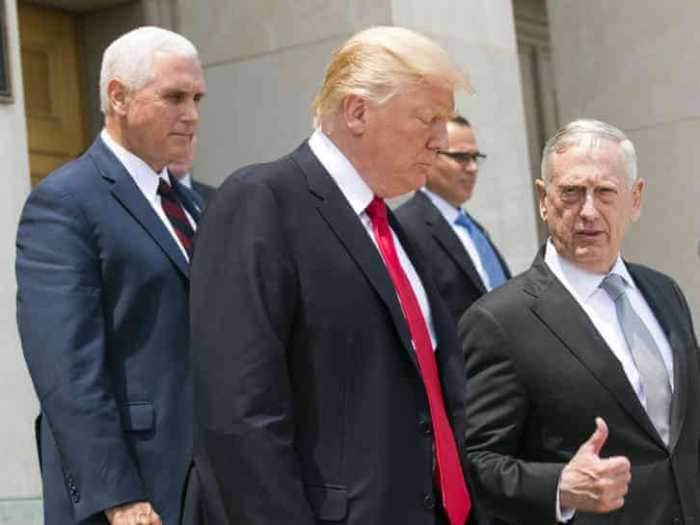US District Judge Colleen Kollar-Kotelly rejected an emergency DOJ bid to stay her order that the Pentagon begin accepting transgender enlistees on January 1. | DCD.USCOURTS.GOV
Federal district judges on opposite coasts dealt setbacks to President Donald Trump’s anti-transgender military policy on December 11.
In the Washington, DC, District Court, Judge Colleen Kollar-Kotelly rejected a motion by the Justice Department in Doe v. Trump to stay her preliminary injunction that requires the Defense Department to allow transgender people to apply to join the service beginning on January 1.
In the Western District of Washington State, Judge Marsha J. Pechman refused to dismiss the complaint in Karnoski v. Trump, a lawsuit challenging the anti-transgender service ban, while granting the plaintiffs’ motion for a preliminary injunction against its implementation.
DOJ bid for emergency stay rejected; a third judge rules against Trump policy
Also on December 11, US District Judge Jesus G. Bernal in California heard arguments in support of a motion for a preliminary injunction in Stockman v. Trump, a fourth lawsuit challenging the ban.
Judge Kollar-Kotelly’s decision was predictable, given her October 30 ruling granting the preliminary injunction and a more recent ruling “clarifying,” at the request of the Justice Department, that she really intended to require the Pentagon to allow transgender individuals to begin enlisting on January 1.
The case before Kollar-Kotelly was brought by the National Center for Lesbian Rights and GLBTQ Legal Advocates & Defenders (GLAD).
The Justice Department offered the incredible claim that the January 1 deadline created an emergency situation, but its argument was significantly undercut by reports last week that the Pentagon had, in response to Kollar-Kotelly’s earlier order, put into motion the steps necessary to comply.
In support of its motion for a stay, DOJ presented a “declaration” from Acting Deputy Assistant Secretary of Defense for Military Personnel Policy Lernes J. Hebert, who claimed that implementing the court’s order on January 1 would “impose extraordinary burdens on the Department and the military services” and that “notwithstanding the implementation efforts made to date, the Department still would not be adequately and properly prepared to begin processing transgender applicants for military service by January 1, 2018.”
The judge found this unconvincing, pointing out that the Pentagon has had almost a year and a half to prepare for this eventuality, dating back to former Secretary of Defense Ashton Carter’s June 2016 directive spelling out a July 1, 2016, implementation date for allowing transgender people to enlist. That deadline was extended for six months by the current Pentagon chief, James Mattis.
“Moreover,” she wrote, “the Court issued the preliminary injunction in this case approximately six weeks ago, and since then Defendants have been on notice that they would be required to implement the previously established policy of beginning to accept transgender individuals on January 1, 2018. In other words, with only a brief hiatus, Defendants have had the opportunity to prepare for the accession of transgender individuals into the military for nearly one and a half years.”
In opposition to the motion, the plaintiffs had submitted a declaration by Dr. George Richard Brown, who has trained “approximately 250 medical personnel working in Military Entrance Processing Stations (MEPS) throughout the military” in anticipation of implementing the enlistment policy, and a declaration by former Secretary of the Navy Ray Mabus, Jr., who stated that “the Services had already completed almost all of the necessary preparation for lifting” the enlistment ban as long as a year ago.
As to the so-called emergency nature of this motion, Kollar-Kotelly wrote, “As a final point, the Court notes that Defendants’ portrayal of their situation as an emergency is belied by their litigation tactics. The Court issued its preliminary injunction requiring Defendants to comply with the January 1, 2018 deadline on October 30, 2017. Defendants did not file an appeal of that decision until November 21, 2017, and did not file the current motion for a stay of that deadline until December 6, 2017, requesting a decision by noon today, December 11, 2017. There is also no indication that Defendants have sought any sort of expedited review of their appeal, the first deadlines in which are not until January, 2018. If complying with the military’s previously established January 1, 2018 deadline to begin accession was as unmanageable as Defendants now suggest, one would have expected Defendants to act with more alacrity.”
Kollar-Kotelly, however, noted the significant practical barriers that will continue to face prospective transgender enlistees. The Pentagon will require that transgender applicants show, generally speaking, that for at least 18 months prior to their applications they have been “stable” with regard to their gender identity. Nobody can enlist, for example, if they have undergone gender confirmation surgery within the past year and a half. Similarly, anybody first diagnosed as having gender dysphoria within the previous 18 months cannot enlist, since they will have to have certified by a licensed medical provider that they have been “stable without clinically significant distress or impairment” for at least 18 months since their diagnosis. And those under treatment, for example taking hormone therapy, will have to show they have been stable for at least 18 months since commencing therapy.
As to DOJ’s argument that the January 1 deadline imposes an “extraordinary burden” on the military, Kollar-Kotelly noted, “There is no evidence in the record that would suggest that the number of transgender individuals who might seek to accede on January 1, 2018, would be overwhelmingly large. To the contrary, although the Court understands that there may be some dispute as to the amount of transgender individuals in the general population and in the military, the record thus far suggests that the number is fairly small.”
The plaintiffs in Karnoski v. Trump, pending in the district court in Seattle, are represented by Lambda Legal and Outserve-SLDN. They alleged four theories for challenging the policy: equal protection, substantive due process in the deprivation of liberty, procedural due process, and freedom of speech. Judge Pechman found that three out of these four theories were sufficiently supported by the complaint to deny the Justice Department’s motion to dismiss the case, although she granted the motion regarding the procedural due process claim.
As had two district judges before her — including, as well, on November 21, Judge Marvin J. Garbis of the Maryland District Court — Pechman cut and pasted screen captures of the president’s July 26 tweet announcing the policy into her opinion, and used particularly cutting language to reject DOJ’s argument that the president’s policy decision was entitled to the kind of judicial deference usually accorded to military policy decisions.
Addressing the DOJ’s reliance on a 1981 Supreme Court ruling on whether the military can limit draft registration to men only, Pechman noted that its ruling there relied on “extensive review of legislative testimony, floor debates, and committee reports,” and held “that Congress was entitled to deference when, in ‘exercising the congressional authority to raise and support armies and make rules for their governance,’ it does not act ‘unthinkingly’ or ‘reflexively and not for any considered reason.’” In contrast, the judge found, “the prohibition on military service by transgender individuals was announced by President Trump on Twitter, abruptly and without any evidence of considered reason or deliberation.” The deference accorded to the military’s draft registration policy, therefore, does not apply to the president’s policy.
President Donald Trump, with one of his “generals,” Defense Secretary James Mattis, and Vice President Mike Pence. | DEFENSE.GOV
Pechman found that the plaintiffs satisfied all the requirements for winning a preliminary injunction against the Trump transgender ban, and she barred the government “from taking any action relative to transgender individuals that is inconsistent with the status quo that existed prior to President Trump’s July 26, 2017 announcement.”
Pechman’s injunction, then, joins those by Kollar-Kotelly and Garbis. All three preliminary injunctions block the discharge of transgender service members while the case is pending and require the Pentagon to allow transgender people to begin enlisting on January 1. The injunctions by Garbis and Pechman also block the administration from refusing to fund transition-related health care, including surgery. In the face of this united front from the three judges, it seems likely that Judge Bernal in California will eventually issue a similar order.
Attention now turns to the courts of appeals that oversee these four district judges, where the DOJ is likely to continue filing appeals.




































